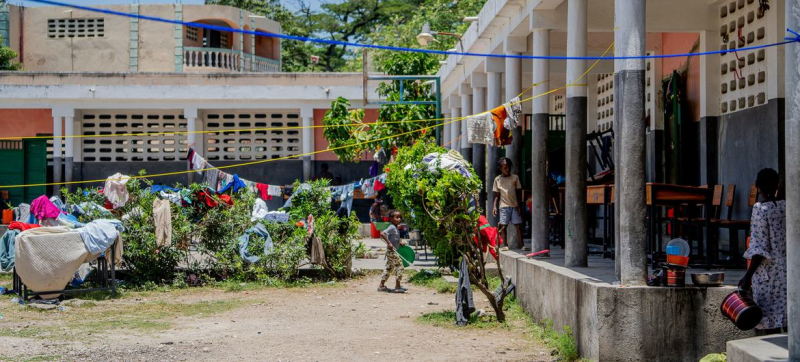- India Sees 9% Drop in Foreign Tourists as Bangladesh Visits Plunge |
- Dhaka Urges Restraint in Pakistan-Afghan War |
- Guterres Urges Action on Safe Migration Pact |
- OpenAI Raises $110B in Amazon-Led Funding |
- Puppet show enchants Children as Boi Mela comes alive on day 2 |
Haitian Schools Shelter Hundreds Fleeing Gang Violence

Anténor Firmin school in Hinche is now a shelter for people displaced by violence.
Gang violence in Haiti has displaced hundreds of thousands of people, many of whom are now seeking shelter in former schools where belief in the power of education remains strong.
The classrooms of Anténor Firmin School in Hinche, central Haiti, are no longer studiously quiet. Once a place of learning, the building now echoes with the sounds of babies crying, water containers clanking, and voices murmuring through the night.
Over 700 people displaced by violence are crammed into the crumbling compound, sleeping on the floors where children once solved maths problems.
Among them is Edens Désir, a former teacher who still believes that education is key to a more prosperous and peaceful future for this beleaguered Caribbean nation.
A trained accountant and former secondary-school teacher, his life was upended by violent clashes that erupted in March 2025 in Saut-d’Eau and Mirebalais, two small towns south of Hinche. Like 6,000 others, he fled massacres, rape, arson, and looting.
“Everything I built, little by little, was destroyed,” he said. “I walked away with nothing.”
Warring gangs have long controlled most of the Haitian capital, Port-au-Prince, some 30 miles (48 km) away. Only recently has their influence spread to more rural areas of the Centre department, where Hinche and Saut-d’Eau are located.
Désir found refuge in the school where he once studied—a place now stripped of its purpose. Desks have become beds. Classrooms have turned into shelters. Families lie packed into rooms never meant to house them.
Even in these crowded rooms, he found a way to start over—not for himself, but for the children around him. Armed with a whiteboard, a marker, and quiet determination, he has brought a sense of purpose to lives thrown off course.
“Ever since I was a kid, I loved teaching,” he explained. “It’s what matters most to me. I’d rather be in front of a class than sitting around doing nothing. For these kids, school is the only real chance they’ve got.”
Once on the verge of expanding a small business, Désir now lives in limbo. “That plan is gone. Violence made sure of it. My only option now is to leave and try to start over somewhere else. But as long as I’m here, I’ll keep sharing what I know.”
These days, he takes life one day at a time. “I can’t make plans anymore,” he said. “Each day, I just figure things out as they come. Each night, I wonder if there will be food tomorrow.”
Clean water is scarce. Long queues stretch at distribution points, where women and children wait patiently, balancing heavy containers. Hygiene conditions are dire. With few latrines and showers, hundreds lack privacy and sanitation. Health risks are growing, especially for the most vulnerable.
Food supplies are equally uncertain. “There are nights I go to sleep without eating,” he said. “But I keep teaching because the kids are here.”
Delivering aid to the displaced is no easy task. The main road between Port-au-Prince and Hinche remains blocked by insecurity, cutting off supply routes and isolating entire communities.
Despite the challenges, the UN’s International Organization for Migration (IOM) has reached over 800 families across 17 displacement sites, providing emergency items such as shelter kits, blankets, kitchen sets, and jerrycans.
IOM teams continue working directly with displaced families, host communities, and local authorities to assess needs and provide relief. Site committees and civil protection teams are being trained to manage shelters more effectively. Fragile sites are being relocated to safer areas, and mental health support is offered to those affected by the violence.
These efforts aim to protect the most vulnerable, especially children, from a crisis they did not choose but are now forced to navigate.
Désir believes that knowledge is the best defence against dehumanisation. When violence tears everything apart—forcing children into displacement, splitting families, and cutting off access to education—teaching becomes an act of resistance.
Even when the days feel heavy, he keeps showing up for the children who still believe in him.
“If we want things to change, we need people who grow into better citizens,” he said. “I don’t know if what I’m doing is enough to make that happen, but it gives me purpose. It breaks my heart to know that one day I’ll have to leave them behind and look for a better future.”

